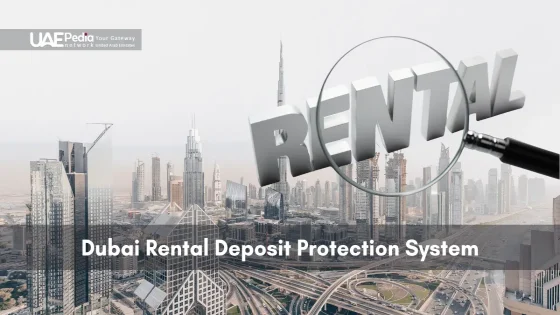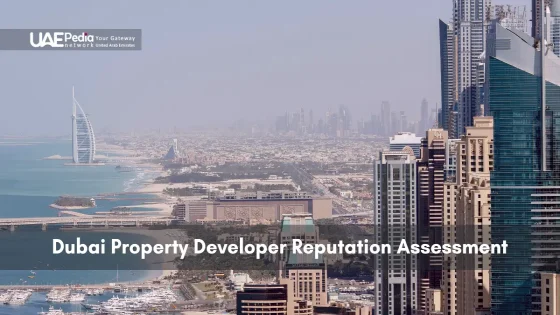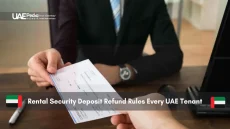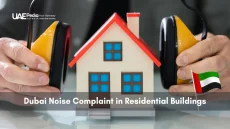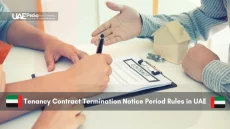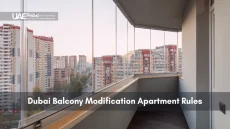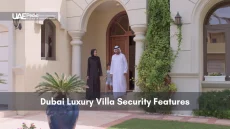What if your security deposit could do more than just gather dust in a landlord’s account? In a city where sleek skyscrapers meet golden dunes, a unique framework ensures fairness for everyone signing a lease. This system—mandated across the emirate—keeps payments secure, transparent, and tied to clear outcomes.
Think of it as a safety net for both parties. Landlords gain assurance against unexpected costs, while tenants avoid disputes over withheld funds. Payments are collected upfront and held by a neutral third party, released only when terms align with tenancy laws. No more guessing games about who pays for that scuffed wall or overdue utility bill.
This guide walks you through everything from legal basics to pro tips. You’ll learn how to document property conditions like a pro, negotiate lease terms confidently, and reclaim your deposit smoothly. Whether you’re settling into a downtown high-rise or a cozy community villa, we’ve got your back with local insights even seasoned residents wish they’d known sooner.
In Dubai, security deposits for unfurnished properties equal 5 % of annual rent (10 % for furnished units) and must be held in segregated escrow or dedicated bank accounts. Law No. 26 of 2007 (amended) requires landlords to refund deposits within 14 calendar days of handover, supported by itemized invoices for any deductions; failure triggers statutory penalties.
Disputes—currently 40 % of RDSC caseload—are mitigated via blockchain-anchored Ejari records, timestamped digital inspections, and optional neutral-escrow deposit platforms. Tenants should archive geo-tagged photos and jointly signed condition reports on move-in; landlords must reconcile against the same dataset at move-out to justify withholdings.
Key Takeaways:
- Regulated deposit process ensures transparent fund protection.
- Third-party escrow prevents landlord-tenant disputes.
- Mandatory documentation and photos secure refund claims.
- Legally mandated 30-day deposit return deadline.
- Itemized deductions require documented contractor invoices.
- Joint walkthroughs and clear lease clauses.
Overview of the Dubai Rental Deposit Protection System
Imagine handing over a chunk of cash when moving into a new place—what exactly happens to that money? In this sun-soaked Emirate, that upfront payment acts like a trust-building handshake. It’s not just about covering potential damages; it’s a shared commitment to respect the space you’ll call home.
What’s a Safety Net for Your Lease?
A security deposit here typically equals one month’s rent Rights for Tenants. Think of it as a safety buffer—landlords use it to address unpaid bills or repairs, while tenants get reassurance against unfair claims. The magic number? Most agreements peg it at 30 days’ worth of your monthly payment, though luxury properties might ask for more.
Local laws outline clear rules for handling these funds. Third parties hold them until lease terms wrap up, creating neutral ground. One resident shared:
“Getting receipts and snapshots of the apartment’s condition saved me $800 in disputed charges.”
Paper trails matter—always document cracks, stains, or quirks before signing anything.
Escrow accounts are managed by Central Bank-licensed, RERA-approved banks to act as neutral third parties. Ref.: “Dubai Land Department (2025). Frequently Asked Questions. Dubai Land Department.”
Why This Dance Benefits Everyone
Landlords sleep easier knowing they’re covered for surprise fixes. Tenants avoid “gotcha” moments when moving out. Transparency upfront cuts post-lease headaches—like arguing over who pays for that mysteriously broken AC.
The system thrives on mutual accountability. Written agreements spell out what counts as damage versus normal wear. When both sides agree on terms early, refunds flow smoother than Arabic coffee. Trust us: snapping timestamped photos beats vague memories when proving your case later.
Read More:
Navigating Legal Requirements and Regulations in Dubai
Ever wonder how local laws turn lease agreements into fair play? The rules here act like referees—keeping everyone honest while letting the game flow smoothly. We’ll break down what’s in the rulebook so you can sidestep surprises.
The Ejari system—mandated by RERA under Law No. 26/2007—ensures every tenancy contract is registered and legally binding. Ref.: “GulfSeasons (2025). Understanding the Ejari Contract in Dubai Real Estate. GulfSeasons.”
Key Provisions You’ll Want Bookmarked
Law No. 26 of 2007 (plus updates) sets the stage. Think of it as the ultimate playbook for property relationships. It mandates that funds must stay in secure accounts until both parties agree on deductions. One tenant told us:
“When my landlord tried charging for pre-existing cracks, the law required them to show dated repair invoices. They couldn’t—so I got my full refund.”
| Legal Provision | Tenant Benefit | Landlord Benefit | Example |
|---|---|---|---|
| Timely refunds | 14-day refund window | Clear exit protocol | Delays trigger penalties |
| Documented deductions | Requires itemized receipts | Proof against false claims | Paint job receipts vs. verbal quotes |
| Annual rent alignment | Limits deposit hikes | Predictable cash flow | 5% max increase if rent rises |
Got a disagreement? The Rental Dispute Settlement Centre steps in like a seasoned mediator. They’ve handled cases ranging from faded curtains (normal wear) to broken tiles (legit claim).
Pro tip: Snap photos of that quirky light switch before signing your agreement. Time-stamped evidence beats “he said, she said” every time.
Under Law 26/2007 (Article 20 amended by Law 33/2008), landlords may collect a deposit but must return it or remaining balance at lease end. Ref.: “Betterhomes (2025). How to Get Your Security Deposit Back in Dubai.”
Determining the Correct Security Deposit Amount and Collection Methods
Ever stared at a lease agreement wondering if that upfront payment makes sense? Let’s break down how to calculate what’s fair—and ensure those funds stay safe until move-out day.
Crunching Numbers Without the Headache
Most agreements peg the security deposit at one to two months’ rent. Compare similar properties in your area—if studios nearby average $1,200 monthly, aim for that range. Luxury units might edge higher, but always verify market benchmarks. A recent tenant shared:
“I checked three listings with matching amenities before negotiating. Saved me $500 upfront!”
| Property Type | Average Rent (Monthly) | Typical Security Deposit | Example |
|---|---|---|---|
| Studio Apartment | $1,200 | $1,200 – $2,400 | 1-2 months’ rent |
| 2-Bed Villa | $2,800 | $2,800 – $5,600 | Flexible based on terms |
| Luxury Penthouse | $5,000+ | Upfront agreement | Custom clauses |
Handling Funds Like a Pro
Always get a receipt when paying. Landlords should store the amount in a separate bank account—transparency prevents “lost” money myths. One pro tip? Mention storage methods in the lease. For example: “Funds held in [Bank Name] escrow account until inspection.”
Curious about secure storage trends? Modern tools now automate tracking, giving both parties real-time updates. Whether you’re a tenant or owner, clear documentation and neutral accounts keep everyone smiling at the finish line.
Documenting Property Condition and Managing Deductions
How can you prove the apartment’s quirks weren’t your fault? Start with a camera and a checklist. Thorough documentation turns “maybe” into “clearly” when settling deductions. We’ll show you how to turn snapshots and notes into airtight evidence.
Snap Now, Save Later: The Art of Visual Proof
Walk through the space with your phone before moving in. Capture every corner—scratched countertops, loose tiles, even dusty blinds. One tenant explained:
“I filmed a slow 360-degree video during my inspection. When the landlord later claimed I’d cracked a sink, the timestamped clip proved it was pre-existing.”
Pair visuals with a written checklist. Note stains, dents, and appliance functionality. Email copies to both parties immediately—this creates a dated paper trail.
| Category | Acceptable Wear | Chargeable Damage |
|---|---|---|
| Walls | Faded paint | Fist-sized holes |
| Floors | Minor scuffs | Deep gouges |
| Appliances | Worn seals | Broken burners |
When Does a Scratch Become a Billable Offense?
Landlords can deduct for:
- Unrepaired holes from wall mounts
- Pet urine stains requiring professional cleaning
- Missing fixtures like curtain rods
Normal wear includes carpet flattening from furniture or minor grout discoloration. Always request repair receipts—verbal estimates don’t count. A property manager shared: “We provide before/after photos with contractor invoices. Transparency keeps everyone honest.”
Final walkthroughs should mirror your initial inspection. Compare old and new images side-by-side. Disputes fade when proof speaks louder than opinions. Remember: meticulous records build trust faster than any argument.
Comprehensive photo and video documentation demands a reliable camera and dedicated time to capture every detail. Ref.: “Bayut (2025). How to receive the full security deposit back from your landlord. Bayut.”
Tips for Tenants and Landlords for a Secure Rental Agreement
What’s the secret to a lease that leaves everyone smiling at checkout? It starts with clarity—not just in paperwork, but in expectations. Let’s crack the code for partnerships where both sides win.
Blueprints for Mutual Trust
Always draft specific clauses about how to get security deposit back. One tenant advised:
“We added a line requiring photo evidence for deductions. Saved us from a $300 ‘cleaning fee’ for dust that was already there.”
Landlords benefit too—cleartermsprevent disputes over ambiguous damage claims.
Try this during negotiations:
- Define “normal wear” versus damage in your agreement
- Schedule joint walkthroughs 48 hours before move-out
- Include a timeline for returning the deposit back
| Tenant Checklist | Landlord Checklist |
|---|---|
| Request receipts for all payments | Provide bank statements showing held funds |
| Keep dated photos of pre-existing issues | Share inspection reports annually |
Review contracts like detectives. Missing a clause about security deposit back procedures? Red flag. Tenants should ask for repair histories; landlords can request employment verification. Transparency builds bridges faster than legalese burns them.
Pro tip: Email digital copies of your signed agreement to both parties immediately. Cloud storage beats lost papers when proving your case later. Remember—good terms aren’t restrictive. They’re the guardrails that let everyone cruise stress-free.
Steps for a Hassle-Free Deposit Return Process
Picture this: You’re handing over keys after a lease ends. The final step—reclaiming your funds—should feel like crossing a finish line, not starting a new race. Here’s how to streamline the process so everyone walks away satisfied.
Paper Trails That Speak Louder Than Words
Start with a room-by-room checklist during the final walkthrough. Compare it to your move-in notes and photos. Landlords should list deductions like a grocery receipt—specific and dated. One property manager shared:
“We break down costs: ‘$45 for light fixture replacement’ instead of ‘miscellaneous repairs.’ Tenants appreciate the clarity.”
Include vendor invoices or repair estimates. Vague charges like “cleaning fees” won’t hold up if challenged.
Beat the Clock, Avoid the Drama
Local regulations mandate refunds within 30 days after vacating. Mark your calendar: day 31 triggers penalties for delays. Pro tip: Send a polite reminder email on day 25. A tenant told us:
“A quick message saying ‘Looking forward to wrapping things up!’ kept communication positive.”
| Scenario | Action | Timeline |
|---|---|---|
| No disputes | Full refund | By day 30 |
| Partial deductions | Itemized statement + remaining funds | By day 30 |
| Disagreements | Formal mediation request | Within 14 days of statement |
If disputes arise, request evidence supporting deductions. Mediation services often resolve issues faster than court. Remember: Calm, documented communication beats heated texts every time.
Follow these steps, and you’ll turn a potentially stressful exchange into a handshake moment. After all, good endings pave the way for better beginnings.
Delays beyond the 30-day refund window trigger statutory penalties for landlords and can escalate into formal disputes. Ref.: “Metahomes (2025). Dubai Tenancy Laws 2025: What Every Renter Needs to Know. MetaHomes.”
Final Steps for a Smooth Rental Experience in Dubai
Mastering your lease journey starts with three pillars: clarity, evidence, and trust. Nail the exact amount upfront using local benchmarks—no guesswork needed. One tenant grinned: “Comparing five similar units gave me leverage to negotiate fair terms.”
Keep that landlord-tenant relationship thriving through shared checklists and photo timelines. Store bank account records alongside repair receipts—transparency turns potential clashes into handshake moments. When deductions arise, demand itemized costs tied to specific damages.
Check out the below:
Dubai’s real estate scene rewards those who play by the rules. Return deposits within the legal window, and challenge vague claims through mediation. A crisp agreement isn’t just paperwork—it’s your blueprint for stress-free living.
Grab your phone, snap those light switches, and stride into your next lease like a pro. With smart prep and cultural savvy, you’ll turn property transitions from headaches into triumphs. Ready to make your mark? The keys—and confidence—are yours.
Typically, landlords request up to 5% of the annual rent for unfurnished properties and 10% for furnished ones. Always confirm the exact amount in your tenancy contract—this aligns with RERA guidelines to prevent overcharging.
First, review your Ejari-registered agreement. If you’ve documented the property’s condition and followed inspection protocols, file a dispute through the Rental Dispute Settlement Centre. They’ll assess evidence like photos or repair invoices to enforce fair refunds.
No! Normal wear from daily use—like faded paint or loose cabinet handles—isn’t deductible. Landlords can only claim costs for damages beyond “reasonable use,” such as broken tiles or unauthorized wall modifications. Always dispute unclear charges.
By law, they must return remaining funds within 14 days of the final inspection. Delays require written justification with receipts for repairs. Track communication via email or Dubai’s REST app for smoother resolution.
Absolutely. Attend both initial and final walkthroughs to compare the condition report. Take timestamped photos, note existing flaws, and sign mutually agreed records. This minimizes “surprise” deductions later.
Ejari registration mandates secure handling of deposits. If they bypassed this, report it to DLD (Dubai Land Department). Non-compliance risks fines for landlords and strengthens your case for full reimbursement.
Yes—for major breaches like unpaid utility bills, structural alterations without consent, or abandoning the property mid-lease. Even then, landlords must provide itemized bills proving costs exceed the deposit amount.
